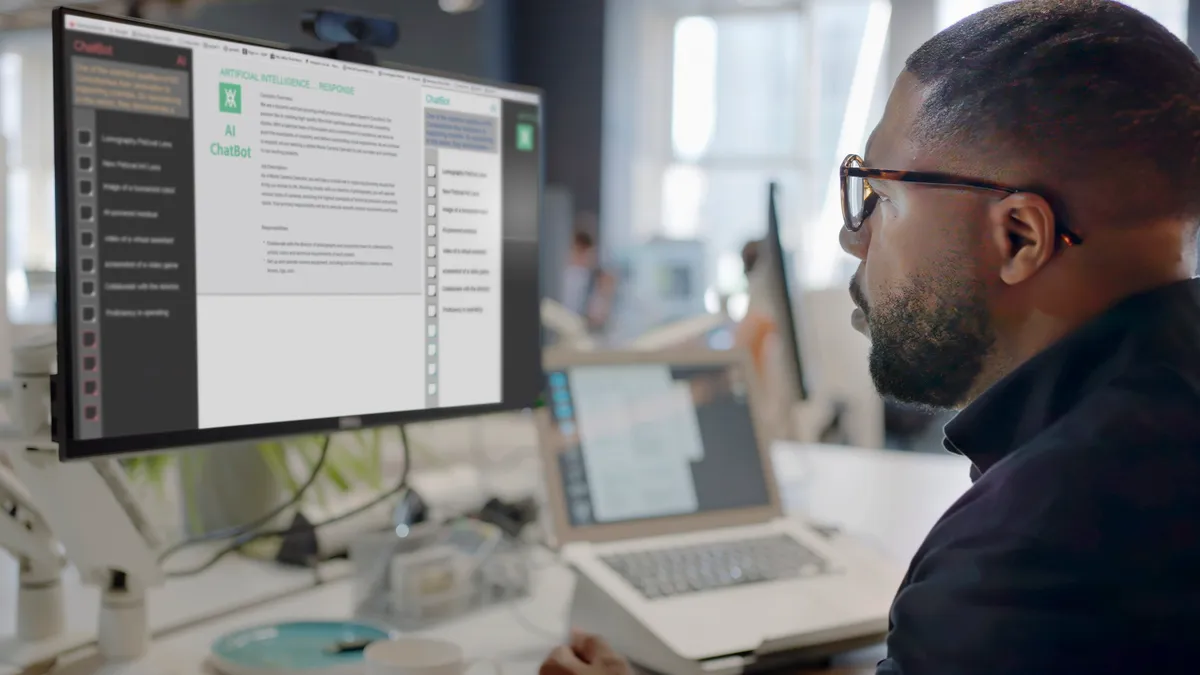Technology executives making device choices for their companies juggle a long list of variables: long-term costs, upfront spending, employee preference and use-case fit — to name a few.
"PCs and Macs almost do different things than Chromebooks," said Jeremy Roberts, research director at Info-Tech Research Group. "That's like saying: motorcycle versus car versus tanks."
Windows-based systems are dominant in enterprise and consumer markets, accounting for 92% of all new PCs globally last year, Gartner data shows. A quarter-billion new PCs running Windows software shipped in 2020, opposed to 22 million computers running MacOS.
Chromebook last year made noticeable strides in enterprise adoption, with new shipments rising 80% year over year to nearly 30 million units, according to Gartner statistics. Analyst firms separate devices such as Chromebooks and iPads from the rest of computing devices when gathering shipment numbers.
Contending with which type of device to deploy, executives consider total cost of ownership for each of these devices, and that includes associated maintenance and management costs. Ultimately, not all systems or companies were created equal, and businesses must also assess use case fit and employee preference in their decision.
Adding complexity to the equation are semiconductor shortages and shipping delays for critical hardware. As supply of key components wears thin, computer manufacturers such as HP expect supply chain constraints to last until at least the end of the year.
"There has been a bit of a paradigm shift and executives no longer really get to choose a single platform," said Brian Flora, founder and principal at Beyond20. It's often user preference and differences across teams which dictate different device choices.
The majority (61%) of engineers turn to Windows for their development environments, according to a survey of 31,743 software engineers published by JetBrains. Linux (47%) and MacOS (44%) trailed the Microsoft operating system in engineer preference.
Still, some organizations will make companywide determinations, aligning their organization with a specific type of device. Type of businesses, necessary applications and price considerations shape this decision alongside user preference, analysts say.
Upfront costs vs. long term spend
Choosing one platform over the other can come down to a question of capital expenditure versus operational expenses, according to Flora. Do companies decide to spend more now or later?
IBM, for example, experienced the economic impact of device choice firsthand. After giving employees their choice of Mac or PC in 2015, IBM said it saved between $273 and $543 for every Mac compared to a PC over a four-year lifespan.
Another study by Apple enterprise management software provider Jamf alongside the University of Kentucky found using Mac devices amounted to a 60% reduction in daily support costs. Apple's MacBook Pro amounted to 36% lower total cost of ownership than other laptops, according to the study. Total cost of ownership for Apple's iMac was 25% lower than other desktops, the study found.
When assessing total cost of ownership, the first and primary consideration is the actual cost of the device, according to Roberts. While Chromebooks tend to sit near the bottom of the spectrum for up-front costs, Mac prices are typically on the higher end. PC options run the gamut.
With its higher up-front cost, Apple devices are a premium-range product. Popular PC makers in the past quarter include Lenovo, HP and Dell, according to Gartner statistics. Their prices can range widely, from a professional grade unit in the thousands of dollars to more basic devices at just a few hundred dollars. By contrast, Chromebooks are lightweight laptops that operate like tablets and focus on web-based applications.
Pitted against Windows laptops, Chrome devices could deliver a 52% reduction on total cost of ownership for a mid-sized enterprise over a three-year span, according to a projection by the Enterprise Strategy Group commissioned by Google. The study found ChromeOS devices reduced cost of administration due to lower deployment, administration, support, maintenance and power costs.
Management
Ability to manage devices, and the impact on cost, is another variable IT must consider. Flexibility is key, particularly as hybrid work frameworks evolve with the ebbs and flows of the pandemic.
Manageability of devices is a close-second consideration when assessing systems, Roberts said. Use case fit is relevant here, as Chromebook devices fit in well with the needs of education. "They have a little cart, they roll the Chromebooks in and everybody just grabs one," said Roberts. "It doesn't matter, it's all in the cloud."
Heavy reliance on the internet and connectivity can afford Chromebooks more simplicity in management.
"The cloud-first or cloud-native feature of a Chromebook certainly makes it more attractive from a deployment and maintenance standpoint," said Flora. Central management and security becomes easier with all applications being in the cloud.
Managing technology as employees adapt to a work-anywhere model means added pressure on IT. Businesses choosing systems today grapple with how the different platforms can support equipment breakdown or remote troubleshooting.
Additionally impacting total cost of ownership is staff and bandwidth to support the devices. Different platforms will have different needs in terms of support, said Mark Hillyard, chief technical officer at Beyond20.
"While you can get vendor support, and you should, you have to consider the knowledge base and the skill set of your internal resources to actually support these things," said Hillyard.
Lifespan and use case fit
Device choice is a question that can have a long-lasting impact for a business. Not only financially, but in terms of the durability of the hardware.
Most companies today space their refresh cycles to three to five years, according to Roberts. Among the options on the field, a Chrome device can outpace peers in terms of future-proofing due to their reliance on the cloud.
But the drawback of the cloud-based option is the range of applications it can ultimately support. Application incompatibilities are the main problem enterprise Chromebook users contend with.
Hardware across the board just has a shorter lifespan today, due to how fast technology performance advances, said Hillyard.
"It's important to look at the workload needs, mobility needs, data security needs, and whether you want your hardware costs to be OpEx or CapEx," said Flora. But matching company and employee with the type of hardware provided "will probably end up outranking the actual dollar cost per unit in terms of the decision," said Flora.




















